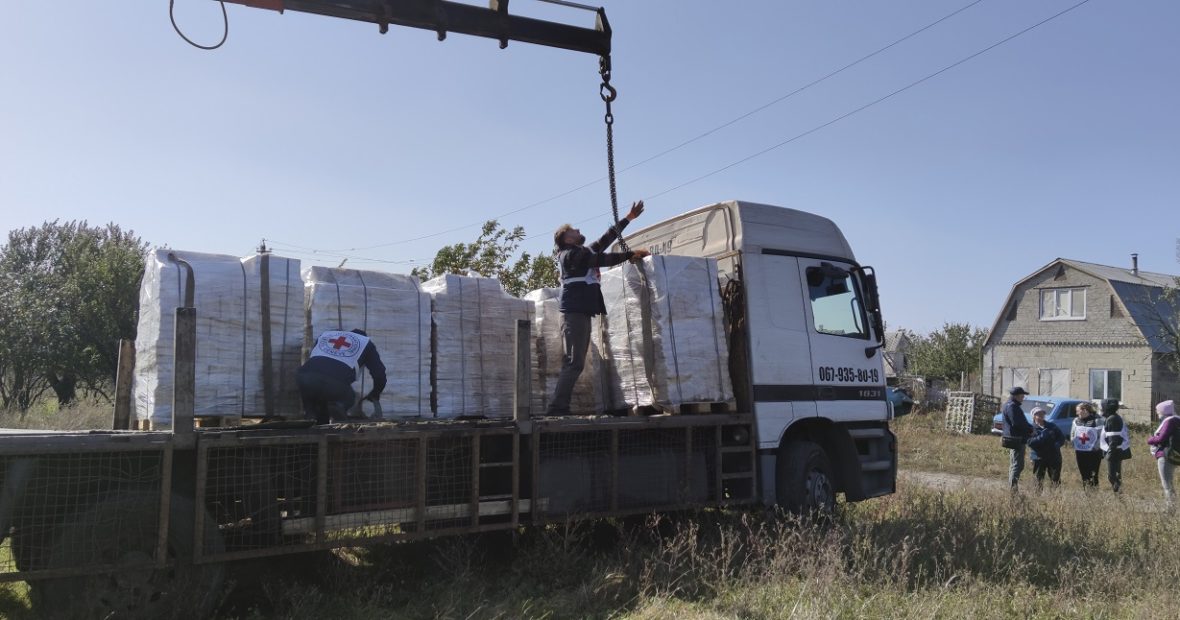News release 07 February 2022 Ukraine
Each day is a struggle for survival for hundreds of thousands of people living close to the line of contact in eastern Ukraine. Water, gas, and electricity supplies are limited. The combination of cold, Covid-19 and chronic uncertainty make basic needs a challenge. After eight years of conflict, the humanitarian needs are huge.
In response, the International Committee of the Red Cross (ICRC) is delivering urgent assistance – food, fuel for heating, medical supplies, and support for housing – to those suffering on both sides of the line of contact.
“The situation in eastern Ukraine is desperately challenging for so many people and families. The International Committee of the Red Cross is committed to working alongside them and helping in every way we can,” says Florence Gillette, the ICRC’s head of delegation in Ukraine.
“Along with the Ukrainian Red Cross Society and Red Cross Red Crescent Movement partners, we stand ready to step up our humanitarian response should the need arise.”
The current subzero temperatures are compounding the situation for many families.
“People are telling us their priority is getting through the winter safe and warm. Winter is harsh here, especially for older people,” says Daniel Bunnskog, ICRC’s deputy head of delegation. “To help those in need, we provide a range of support, from insulating people’s houses to improving their energy efficiency to providing fuel or cash assistance to heat the homes of 35,000 people on either side of the contact line.”
Sofia Reznik is an ICRC psychologist. Her concern is the mental toll on people living through a time of heightened uncertainty.
“Considering the atmosphere of tension in and around Ukraine, many older residents have had memories of previous wars resurface. We’re hearing a lot of people comparing the situations, with great sadness and a sense of hopelessness.
“Now, as they approach the end of their lives, they are again witnessing an uncertain and unstable world. They live in constant fear for their lives due to the ongoing conflict,”
Ms Reznik says.
As it has throughout the conflict, the ICRC is maintaining a confidential and bilateral dialogue with all sides to ensure that civilians and essential infrastructure are protected.
“Our message to all sides is clear: civilians and infrastructure ensuring the delivery of essential services to them must be spared, families must be able to see and support each other, and detainees must be treated humanely, in line with what international humanitarian law demands in all armed conflict,” says Ms Gillette.
In the last 12 months, ICRC assistance activities in support of communities on both sides of the line of contact included:Around 35,000 people received solid fuel or cash assistance to help heat their houses this winter.
- 37,000 people along the line of contact were supported with regular supplies of food and hygiene items.
- 51 hospitals and 61 primary healthcare facilities on either side of the line of contact received medical equipment to cope with the COVID-19 pandemic and emergency preparedness.
- Water stations on either side of the line of contact have been repaired, providing water to around 872,000 people.
- Over 22,000 people increased their knowledge of mine risks during educational sessions, run with participation of the URCS, and 7,350 mine warning signs were donated to help mark hazardous areas.
- 5,600 households received ICRC support to repair their damaged homes.



Comments